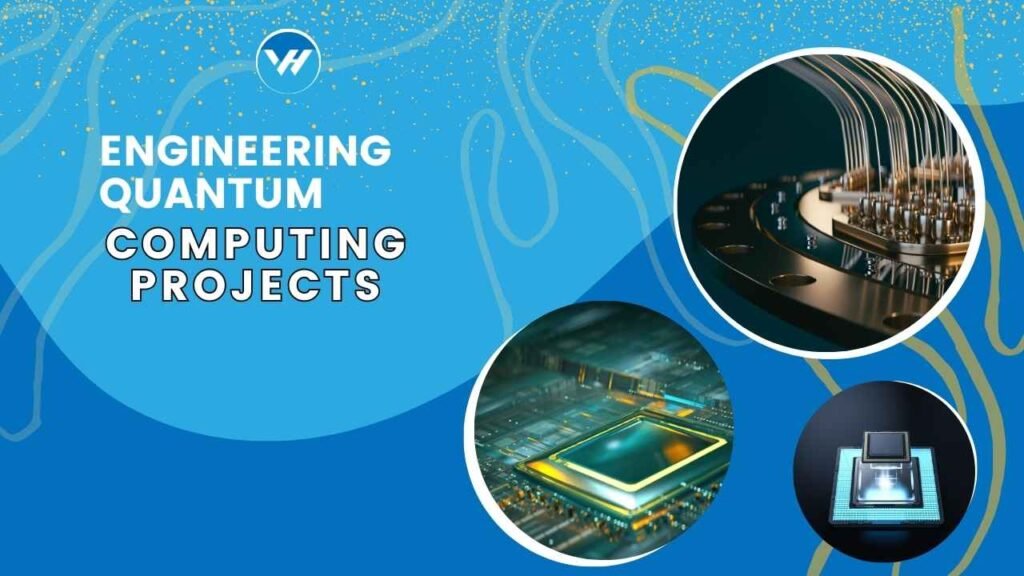Welcome to the exciting world of quantum computing! If you’re an engineer or a student interested in cutting-edge technology, you’ve probably heard about quantum computing and its potential to revolutionize various fields. In this article, we’ll dive into the basics of quantum computing, explore its applications in engineering, and guide you through starting your own quantum computing projects. Plus, we’ll introduce you to Virtual Help, an online platform that can connect you with tutors and assignment help for your quantum computing journey.

Table of Contents
ToggleBasics of Quantum Computing
What is Quantum Computing?
Quantum computing is a type of computation that harnesses the unique properties of quantum mechanics to process information. Unlike classical computers, which use bits as the smallest unit of data (either 0 or 1), quantum computers use quantum bits, or qubits. Qubits can exist in multiple states simultaneously, thanks to two key principles: superposition and entanglement.
Quantum Bits (Qubits)
Qubits are the fundamental units of quantum information. While classical bits can be either 0 or 1, qubits can be both 0 and 1 at the same time, a phenomenon known as superposition. Additionally, qubits can be entangled, meaning the state of one qubit can depend on the state of another, no matter how far apart they are. This interdependence allows quantum computers to perform complex calculations much faster than classical computers.
Quantum Superposition and Entanglement
Superposition enables quantum computers to explore multiple solutions simultaneously, drastically reducing computation time for certain problems. Entanglement provides a powerful way to correlate qubits, leading to faster information processing and secure communication protocols.
Quantum Computing vs Classical Computing
Key Differences
The primary difference between quantum and classical computing lies in how they process information. Classical computers use a sequential approach, processing one bit at a time, whereas quantum computers leverage parallelism through superposition and entanglement, allowing them to solve complex problems more efficiently.
Advantages of Quantum Computing
Quantum computing offers several advantages over classical computing, including:
- Speed: Quantum algorithms can solve certain problems exponentially faster.
- Complexity: Quantum computers can handle highly complex computations, such as simulating molecular structures in chemistry.
- Security: Quantum cryptography promises theoretically unbreakable encryption methods.
Applications of Quantum Computing in Engineering
Computational Chemistry
Quantum computers excel in simulating molecular and chemical reactions, which is highly beneficial for materials science, drug discovery, and nanotechnology. By accurately modeling atomic interactions, engineers can develop new materials and optimize chemical processes.
Cryptography and Security
Quantum computing has the potential to break classical encryption methods, but it also offers new ways to secure data through quantum cryptography. Engineers working in cybersecurity can explore quantum-resistant algorithms to protect sensitive information.
Optimization Problems
Quantum algorithms are particularly suited for solving optimization problems, such as supply chain logistics, financial modeling, and engineering design. By finding optimal solutions more efficiently, quantum computing can lead to significant cost savings and performance improvements.
Types of Quantum Computing Projects
Algorithm Development
One of the most exciting areas of quantum computing is developing new algorithms that leverage quantum principles. Engineers can work on creating quantum versions of classical algorithms or invent entirely new ones to solve specific problems.
Quantum Simulation
Quantum simulation involves using quantum computers to model complex systems, such as chemical reactions or physical processes. This type of project can provide insights into phenomena that are difficult or impossible to study with classical computers.
Quantum Machine Learning
Combining quantum computing with machine learning opens up new possibilities for data analysis and pattern recognition. Quantum machine learning projects can lead to breakthroughs in fields like artificial intelligence, data science, and predictive modeling.
Getting Started with Quantum Computing Projects
Required Knowledge and Skills
To embark on a quantum computing project, you’ll need a solid understanding of quantum mechanics, linear algebra, and programming. Familiarity with classical computing concepts and algorithms is also beneficial.
Recommended Resources and Tools
Several resources can help you get started with quantum computing:
- Books: “Quantum Computation and Quantum Information” by Nielsen and Chuang.
- Online Courses: Courses from platforms like Coursera and edX.
- Quantum Programming Platforms: IBM’s Qiskit, Google’s Cirq, and Microsoft’s Quantum Development Kit.
Setting Up a Quantum Computing Environment
Hardware Requirements
Quantum computers are still in the experimental stage, but you can access quantum processors through cloud services like IBM Quantum Experience. For most projects, a standard computer with internet access is sufficient to connect to these platforms.
Software and Libraries (Qiskit, Cirq, etc.)
Several open-source libraries and frameworks are available for quantum programming:
- Qiskit: An open-source quantum computing framework by IBM.
- Cirq: A Google-developed framework for quantum circuits.
- Microsoft Quantum Development Kit: A comprehensive toolkit for quantum programming.
Step-by-Step Guide to a Basic Quantum Project
Project Planning
Start by defining the problem you want to solve and outline the steps needed to achieve your goal. Break down the project into smaller tasks and set achievable milestones.
Writing Quantum Code
Use a quantum programming framework like Qiskit to write your quantum code. Begin with simple quantum gates and gradually build more complex circuits. Test each part of your code to ensure it works correctly.
Running and Testing the Code
Once your code is ready, run it on a quantum simulator or a real quantum processor. Analyze the results and make necessary adjustments. Keep iterating until you achieve the desired outcome.
Advanced Quantum Computing Projects
Quantum Algorithms for Optimization
Explore advanced quantum algorithms, such as Grover’s algorithm for searching unsorted databases or the Quantum Approximate Optimization Algorithm (QAOA) for solving combinatorial problems.
Quantum Cryptography Implementation
Implement quantum cryptographic protocols, like Quantum Key Distribution (QKD), to enhance data security. Study existing protocols and experiment with your own variations.
Quantum Error Correction
Quantum computers are prone to errors due to decoherence and noise. Research and implement quantum error correction codes to improve the reliability of quantum computations.
Challenges in Quantum Computing Projects
Technical Challenges
Quantum computing faces several technical challenges, including qubit coherence, error rates, and scalability. Engineers must develop innovative solutions to overcome these obstacles.
Practical Considerations
In addition to technical challenges, practical considerations like cost, availability of quantum hardware, and the steep learning curve can impact the feasibility of quantum computing projects.
Future of Quantum Computing in Engineering
Emerging Trends
Stay updated on emerging trends in quantum computing, such as hybrid quantum-classical algorithms, advancements in quantum hardware, and new applications in various fields.
Potential Impact on Various Fields
Consider the potential impact of quantum computing on different engineering disciplines, from aerospace and automotive to energy and telecommunications. Quantum computing is poised to drive innovation across industries.
How Virtual Help Can Assist in Quantum Computing Projects
Finding Tutors
Virtual Help is an excellent resource for finding tutors who specialize in quantum computing. Whether you need help with a specific concept or guidance on a project, Virtual Help connects you with experts in the field.
Getting Assignment Help
Struggling with a quantum computing assignment? Virtual Help offers assignment assistance to ensure you grasp the material and complete your tasks effectively.
Virtual Help App Overview
Download the Virtual Help app on your iOS or Android device to access a wide range of educational resources, connect with tutors, and get assignment help anytime, anywhere.
Conclusion
Quantum computing is a fascinating and rapidly evolving field with immense potential in engineering. By understanding the basics, exploring various applications, and starting your own projects, you can contribute to this exciting technological frontier. Remember, resources like Virtual Help are available to support you every step of the way.
FAQs
What is quantum computing?
Quantum computing is a type of computation that uses quantum-mechanical phenomena, such as superposition and entanglement, to perform operations on data.
How does quantum computing differ from classical computing?
Unlike classical computing, which uses bits as the smallest unit of data, quantum computing uses qubits that can exist in multiple states simultaneously, allowing for faster and more complex computations.
What are the main applications of quantum computing in engineering?
Quantum computing has applications in computational chemistry, cryptography, optimization problems, and more.
How can I start a quantum computing project?
Begin by learning the fundamentals of quantum mechanics, linear algebra, and programming. Use resources like books, online courses, and quantum programming platforms to gain practical experience.
How can Virtual Help assist with quantum computing projects?
Virtual Help connects you with tutors and offers assignment assistance to help you understand quantum computing concepts and complete your projects successfully.





